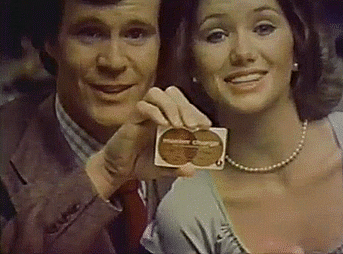Congratulations! You've Ubered and Grubhubbed and online-shopped your way into credit card debt. Now you're an adult who's incurred enough debt to make a credit card company very frustrated with you. Welcome to the maxed out club!
The first time you realize that you've maxed out a credit card, you may panic, but there are many recourses you can take that aren't openly advertised by credit card companies. Some will impact your credit score more than others, but if you've come this far, you've probably realized that a credit score is just life's homework, and there's always a way to half-ass the assignment during homeroom.
Debt Forgiveness
NationalDebtRelief.com
Listen: Credit card companies are like distant relatives from whom you've been forced to borrow money. You are fully expected to pay it back; but sometimes they just give up on you. If you've been missing multiple payments and are clearly falling behind what you could ever feasibly repay, you can call your creditor to negotiate a way to settle your debt. You reach an agreement to pay a lower amount than what you owe, and they agree to forgive the difference.
It's not a perfect plan, however; a note is added to your credit report that you've settled a debt you couldn't pay. Your credit score could take a hit, plus any forgiven balance over $600 is counted as "taxable income" by the IRS, meaning you could end up owing taxes on it.
▲Transfer a Balance
If your credit score is still decent, you may be able to transfer part of your maxed out credit card's balance to a different credit card or even open a new line of credit. (Keep in mind that every time you apply for a new credit card, it can affect your credit score as a "hard inquiry," so choose wisely and wait in between applications). A "good" credit score of around 700 will make you eligible for zero-interest balance transfers, which can be excellent opportunities to lower your debt without accruing any more interest. Just be sure to check if there are balance transfer fees!
▲Stop Spending So Much
This sounds obvious, but it's all too easy to adapt a fatalistic attitude that you'll just drown in debt and so going out for tapas with friends isn't going to screw you over any more than you're already screwed. But that's the misguided and deeply counter-productive approach to handling your debt. In fact, surveys show that 50% of Americans have at least one maxed out credit card in 2019, so you're certainly not alone.
Create a spending plan or act like a grown millennial and download a budgeting app. Stop ordering out when you're drunk, and learn to brew your own damn coffee. Sorry, our anger isn't directed at you, but at the capitalist enterprise that's brainwashed us into mindless consumption at all times.
▲File for Bankruptcy
No one wants to file bankruptcy. I don't want that for you, and I don't even know you. But in certain situations, it can be the best way out. The most important thing to do is to thoroughly do your research, evaluate your debt, and assess your long-term financial goals to see if filing a Chapter 7 or a Chapter 13 bankruptcy is the right move for you. Are you clear about the differences? (Mainly, you still pay a portion of your debt through Chapter 13). Do you know that you can only file bankruptcy once every 8 years? Are you aware that you are not forgiven for any student loan debt, child support, alimony, or tax debts if you file? Do any of your loans involve cosigners?
If you choose to file, your credit score will take an immediate hit, but you can begin building up good credit again as soon as the debt is forgiven. It can take as little as one year to re-build good credit after filing, but it's precarious if your circumstances and spending habits haven't changed.
▲Do Nothing?
It may sound odd, but there are certain circumstances when having a maxed out credit card can help you. If you're eligible for a credit card company's promotional offer of 0% interest, sometimes consolidating all your debt on one card is ultimately better than paying interest on many separate accounts. USA Today calls this "a lesser-of-two-evils situation. On the one hand, maxing out a card could hurt your credit score. But on the other, you'll save a lot of money on interest if you pay off the balance before the interest-free period is up. Plus, you'll be eliminating the balances on several cards as part of the consolidation process, which could give your credit score a modest bump. All things considered, it's probably best to opt for the consolidation."
Have a realistic idea of how long it would take you to pay off the balance. If it's possible to pay your debt within the interest-free period, then congratulations, you've made the system work for you.
▲- The Well-Kept Secret of Debt Negotiation - PayPath ›
- Reasons to cancel your credit card from time to time - PayPath ›
- Holiday Credit Card Debt: Your Guide to Holiday Spending - PayPath ›
- The Little-Known Lifeline for People Drowning in Credit Card Debt ... ›
- What to Do if You're Drowning in Debt | DaveRamsey.com ›
- What is a Maxed-Out Credit Card? ›
- 50% Of Americans Have Maxed Out Credit Cards, Here's How To ... ›
- What to Do When You Max Out Your Credit Cards | Experian ›
- The Only 4 Times You Should Max Out Your Credit Card ›
- How to restore credit after maxing out cards - CreditCards.com ›
- 6 Easy Steps to Take After Maxing Out Your Credit Card | US News ›
- 7 things not to do when you've maxed out your credit cards ... ›
